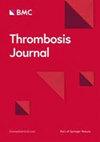在炎症和肺纤维化的双重作用下,CTD-ILD 患者更容易发生 VTE
IF 2.6
4区 医学
Q2 HEMATOLOGY
引用次数: 0
摘要
作为一种自身免疫性疾病,结缔组织病(CTD)相关的持续性全身炎症反应参与了静脉血栓栓塞症(VTE)的发生。然而,临床数据显示,不同亚型结缔组织病患者发生 VTE 的风险不同,这表明不同亚型结缔组织病可能具有促进 VTE 发生的独立机制,但具体机制目前尚缺乏充分研究。肺纤维化的发生也会导致 VTE 的发生,因此 CTD 相关间质性肺病(CTD-ILD)患者发生 VTE 的风险可能高于单纯 CTD 患者或单纯 ILD 患者。此外,凝血级联反应的激活会促使患者原有的肺纤维化进一步发展,从而继续增加患者发生 VTE 的风险,并对预后产生不利影响。目前,治疗 CTD-ILD 的方法主要是免疫抑制和抗风湿治疗,如使用糖皮质激素和 janus 激酶抑制剂(JAKis)等,但矛盾的是,这些药物也参与了患者凝血倾向的形成,这使得具有较高 VTE 发生风险的 CTD-ILD 患者的临床治疗面临挑战。本文综述了CTD-ILD患者发生VTE的潜在危险因素及相关机制,为临床治疗和预防提供参考。本文章由计算机程序翻译,如有差异,请以英文原文为准。
Under the dual effect of inflammation and pulmonary fibrosis, CTD-ILD patients possess a greater susceptibility to VTE
As an autoimmune disease, the persistent systemic inflammatory response associated with connective tissue disease (CTD) is involved in the development of venous thromboembolism (VTE). However, clinical data showed that the risk of VTE in patients differed between subtypes of CTD, suggesting that different subtypes may have independent mechanisms to promote the development of VTE, but the specific mechanism lacks sufficient research at present. The development of pulmonary fibrosis also contributes to the development of VTE, and therefore, patients with CTD-associated interstitial lung disease (CTD-ILD) may be at higher risk of VTE than patients with CTD alone or patients with ILD alone. In addition, the activation of the coagulation cascade response will drive further progression of the patient’s pre-existing pulmonary fibrosis, which will continue to increase the patient’s risk of VTE and adversely affect prognosis. Currently, the treatment for CTD-ILD is mainly immunosuppressive and antirheumatic therapy, such as the use of glucocorticoids and janus kinase-inhibitors (JAKis), but, paradoxically, these drugs are also involved in the formation of patients’ coagulation tendency, making the clinical treatment of CTD-ILD patients with a higher risk of developing VTE challenging. In this article, we review the potential risk factors and related mechanisms for the development of VTE in CTD-ILD patients to provide a reference for clinical treatment and prevention.
求助全文
通过发布文献求助,成功后即可免费获取论文全文。
去求助
来源期刊

Thrombosis Journal
Medicine-Hematology
CiteScore
3.80
自引率
3.20%
发文量
69
审稿时长
16 weeks
期刊介绍:
Thrombosis Journal is an open-access journal that publishes original articles on aspects of clinical and basic research, new methodology, case reports and reviews in the areas of thrombosis.
Topics of particular interest include the diagnosis of arterial and venous thrombosis, new antithrombotic treatments, new developments in the understanding, diagnosis and treatments of atherosclerotic vessel disease, relations between haemostasis and vascular disease, hypertension, diabetes, immunology and obesity.
 求助内容:
求助内容: 应助结果提醒方式:
应助结果提醒方式:


